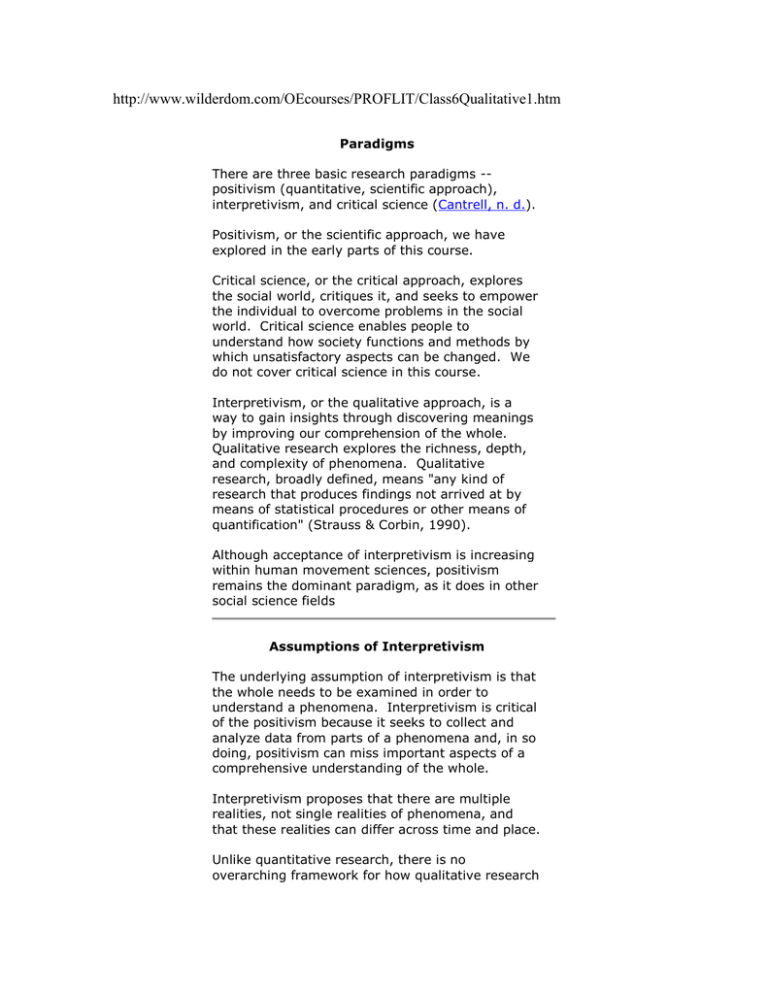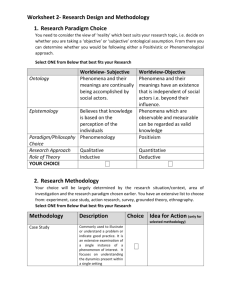Document 14989798
advertisement

http://www.wilderdom.com/OEcourses/PROFLIT/Class6Qualitative1.htm Paradigms There are three basic research paradigms -positivism (quantitative, scientific approach), interpretivism, and critical science (Cantrell, n. d.). Positivism, or the scientific approach, we have explored in the early parts of this course. Critical science, or the critical approach, explores the social world, critiques it, and seeks to empower the individual to overcome problems in the social world. Critical science enables people to understand how society functions and methods by which unsatisfactory aspects can be changed. We do not cover critical science in this course. Interpretivism, or the qualitative approach, is a way to gain insights through discovering meanings by improving our comprehension of the whole. Qualitative research explores the richness, depth, and complexity of phenomena. Qualitative research, broadly defined, means "any kind of research that produces findings not arrived at by means of statistical procedures or other means of quantification" (Strauss & Corbin, 1990). Although acceptance of interpretivism is increasing within human movement sciences, positivism remains the dominant paradigm, as it does in other social science fields Assumptions of Interpretivism The underlying assumption of interpretivism is that the whole needs to be examined in order to understand a phenomena. Interpretivism is critical of the positivism because it seeks to collect and analyze data from parts of a phenomena and, in so doing, positivism can miss important aspects of a comprehensive understanding of the whole. Interpretivism proposes that there are multiple realities, not single realities of phenomena, and that these realities can differ across time and place. Unlike quantitative research, there is no overarching framework for how qualitative research should be conducted; rather each type of qualitative research is guided by particular philosophical stances that are taken in relation by the research to each phenomenon (O'Brien, n. d.). Main Types of Qualitative Research Case study Attempts to shed light on a phenomena by studying indepth a single case example of the phenomena. The case can be an individual person, an event, a group, or an institution. Grounded theory Theory is developed inductively from a corpus of data acquired by a participant-observer. Phenomenology Describes the structures of experience as they present themselves to consciousness, without recourse to theory, deduction, or assumptions from other disciplines Ethnography Focuses on the sociology of meaning through close field observation of sociocultural phenomena. Typically, the ethnographer focuses on a community. Historical Systematic collection and objective evaluation of data related to past occurrences in order to test hypotheses concerning causes, effects, or trends of these events that may help to explain present events and anticipate future events. (Gay, 1996) Main Types of Qualitative Data Collection & Analysis "Those who are not familiar with qualitative methodology may be surprised by the sheer volume of data and the detailed level of analysis that results even when research is confined to a small number of subjects" (Myers, 2002). There are three main methods of data collection: Interactive interviewing People asked to verbally described their experiences of phenomenon. Written descriptions by participants People asked to write descriptions of their experiences of phenomenon. Observation Descriptive observations of verbal and non-verbal behavior. Analysis begins when the data is first collected and is used to guide decisions related to further data collection. "In communicating--or generating--the data, the researcher must make the process of the study accessible and write descriptively so tacit knowledge may best be communicated through the use of rich, thick descriptions" (Myers, 2002).






